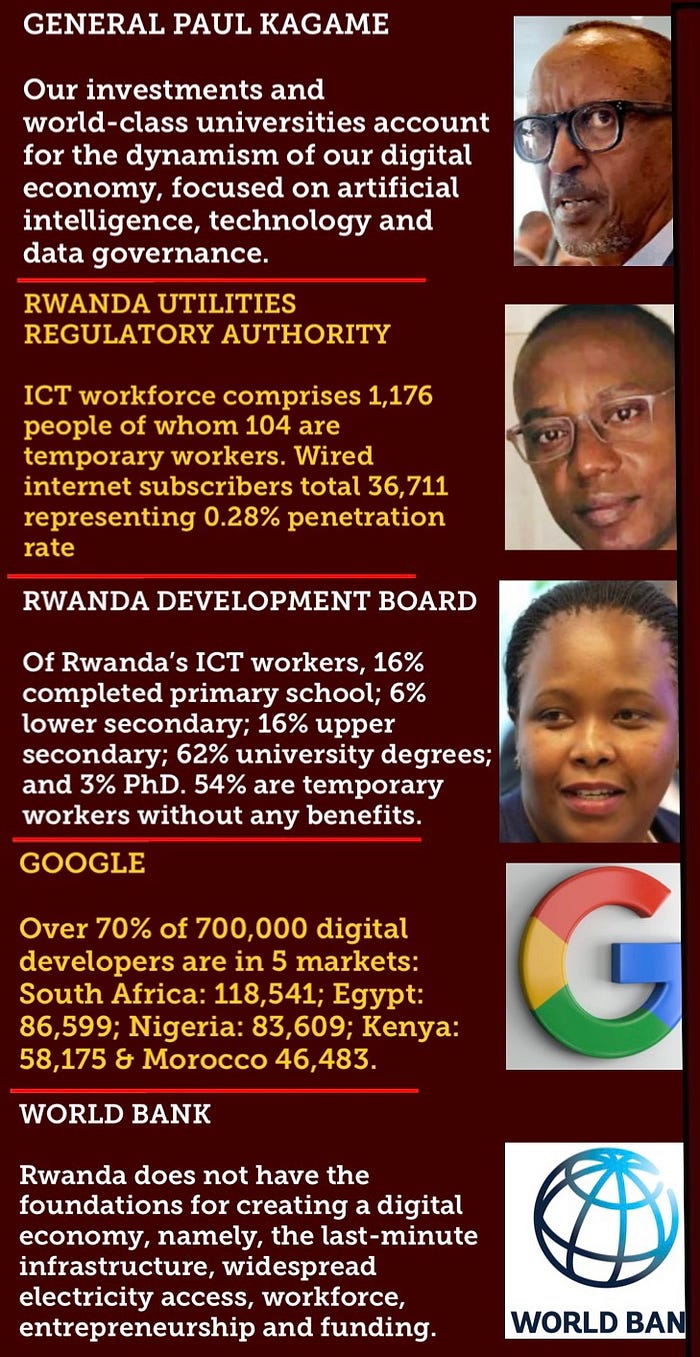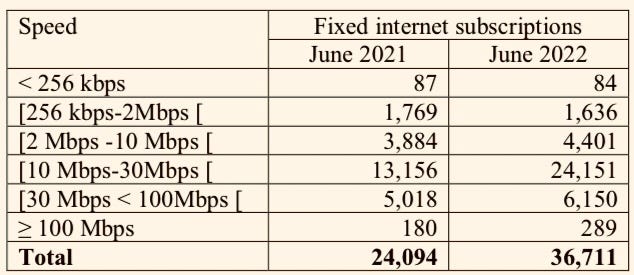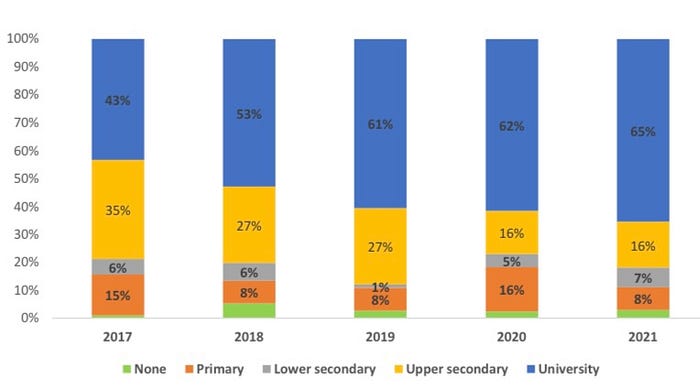By David Himbara
Rwanda’s digital economy and world-class universities are a stretch of imagination. The data from General Paul Kagame’s own government, Google, International Finance International Finance Corporation (IFC), and the World Bank demonstrate the absurdity of Kagame’s rhetoric. The notion that Rwanda has a thriving digital economy focused on artificial intelligence, machine learning, data governance and world-class universities is self-deception of extreme kind.

General Paul Kagame proclaimed in 2022 that Rwanda’s digital economy is powered by “the investments that we, as a country, have been making in science and technology.” Rwanda “focuses primarily on artificial intelligence (AI), machine learning, and data governance,” he added. Kagame repeated these claims at the G77 Summit + China Summit of Heads of State and Government held in Cuba on September 14, 2023, as follows:
“In Rwanda, we have focussed on digital skills and technology and data governance frameworks. In line with this objective, we have invested in digital skills and literacy. Today, the Kigali Innovation City is home to world-class universities where students including women and girls have the opportunity to specialize in digital skills.”
Data from Kagame’s own government
The data from Kagame’s own government, Google, IFC, and the World Bank demonstrate the absurdity of Kagame’s rhetoric. Begin with data from the Rwanda Utilities Regulatory Authority (RURA) regarding the ICT workforce. As of June 2023,
“One thousand two hundred sixty-four (1,264) persons were employed in the telecommunication sector; one thousand one hundred forty-one (1,141) are permanent staff whereas one hundred twenty-three (123) are temporary staff.“
RURA’s data also shows the extreme low access level to internet broadband as shown in Table 1. The number of fixed internet subscribers is 36,711 representing 0.28 percent penetration rate in Rwanda as of June 2022.
Table 1: Wired internet Subscribers in Rwanda

The overwhelming majority of Rwandans depends on old mobile internet technologies such as GPRS which cannot send data while a voice call is in progress and is easily hacked. The number of subscribers in Rwanda that depend on GPRS and EDGE stands at 5.3 million people constituting 41 percent penetration rate. There are only 310,631 subscribers in Rwanda who can afford the 4G technology which provides seamless internet connectivity without the need for a wired connection.
Next is the data from the Rwanda Development Board (RDB) regarding the skill levels and terms of employment in Rwanda’s ICT sector. The education levels in Rwanda’s ICT sector are shown in Figure 2.
Figure 2: Education Levels in Rwanda’s ICT Workforce

As shown in Figure 2, Rwanda’s ICT workforce includes workers who completed primary school education amounting to 8 percent; 7 percent completed lower secondary school; 16 percent completed upper secondary school; and 65 percent hold a university degree. RDB indicates that “only 3 hold a PhD.” The extreme poverty of human capital in Rwanda’s ICT sector is further exposed by RDB in the following terms:
“Less than a half of the people employed in the ICT sector (45%) are formally employed. Put differently, more than half of the people employed in the ICT sector (54%) either contract or are not entitled to medical insurance and annual and incidental leave.”
Rwanda’s Professional Developers Compared to Africa and the East African Region
Google and IFC established that there are nearly 700,000 professionaldevelopers across Africa. However, as shown in Figure 2, most of the African developer population is concentrated in five countries. South Africa leads with 118,541 professionals; Egypt, 86,599; Nigeria, 83,609; Kenya; 58,175; and Morocco, 46,483.
Figure 2: Developer Professionals in African Countries

In the case of the East African Community (EAC), Kenya is the leader with 58,175; Tanzania, 15,008, Uganda, 11,003; and Rwanda, 3,983.
World Bank’s Diagnostic Assessment of Rwanda’s Digital Economy
The World Bank conducted a diagnostic exercise titled Rwanda: Digital Economy Assessment which is the most thorough analysis to date. Led by Casey Torgusson and Katerina Koinis, the World Bank team of more than 20 experts undertook an initial fact-finding mission to Rwanda, followed by field research in Rwanda that included stakeholder consultations in the public and private sectors. The main finding of the assessment is that Rwanda does not have the foundations for creating a digital economy, namely, the last-minute digital infrastructure; broad access to electricity; digital workforce; digital entrepreneurship and funding. The team sums up their findings in Rwanda as follows:
“Limited access to electricity, internet connectivity, digital devices and digital content present constraints to further developing digital skills training at the primary, secondary and TVET levels. The quality of digital education suffers when skills are taught in theory rather than in practice. In addition, gaps in teacher training and capacity persist from primary school to TVET and university level, limiting the impact of programs in basic education as well as the depth and breadth of advanced education…Training and educational programs are generally characterized by weak linkages to industry, which prevents skills training from being tailored to the needs of the labour market. Companies are reluctant to offer on-the-job training, preferring instead to train existing employees or poach talent from competitors, which perpetuates a skills gap among recent graduates.”
A case of Self-deception
I conclude with the words of Fyodor Dostoevsky, the 19th-century Russian writer, about self-deception: “Above all, don’t lie to yourself. The man who lies to himself and listens to his own lie comes to a point that he cannot distinguish the truth within him, or around him, and so loses all respect for himself and for others. And having no respect he ceases to love.”






























































